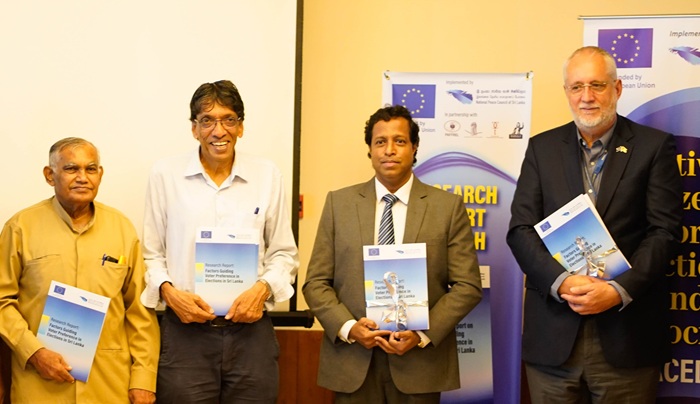
A research report titled Factors Guiding Voter Preference in Elections in Sri Lanka, shows that voters overwhelmingly prioritised candidates who would offer clear strategies to address the economic crisis, fight corruption and ensure good governance.
The report, commissioned by the National Peace Council under the European Union-funded project “Active Citizens for Elections and Democracy”, reveals that 93 per cent of respondents indicated they would vote based on a candidate’s ability to resolve the economic crisis.
The report further states that 83 per cent prioritised candidates committed to tackling corruption, while 86 per cent favoured candidates with strong educational backgrounds, signalling a preference for qualified, competent leaders over political dynasties.
The study also found a decline in the effectiveness of political patronage, with nearly 50 per cent of voters rejecting transactional politics such as food aid distribution, government job promises and infrastructure projects for electoral gain. This indicates a shift towards issue-based and policy-driven decision-making.
Voters are also moving away from identity-based politics, with factors such as ethnicity, religion and age, once dominant in elections, now less influential. A significant percentage of voters focused instead on leadership qualities, governance policies and economic strategies, it added.
The Factors Guiding Voter Preference in Elections in Sri Lanka research report was launched on 27 June in Colombo.
The study conducted by Dr. Mahesh Senanayake and Ms. Crishni Silva of the University of Colombo offers valuable insights into the key drivers of voter behaviour within Sri Lanka’s dynamic political context. It examines how factors such as economic concerns, perceptions of leadership, trust in public institutions and prevailing social issues influence electoral decisions.
The launch event brought together a diverse group of participants, including academics, policymakers, political actors, project partners and media personnel.
Project Manager, Ben Perinpanayagam, who introduced the Active Citizens for Elections and Democracy (ACED) project, outlined its objectives to safeguard and enable civic space and promote political pluralism and inclusion by sharing and applying locally generated knowledge. The project is a collaborative initiative led by NPC in partnership with People’s Action for Free and Fair Elections (PAFFREL), the Association of War Affected Women (AWAW), the Centre for Communication Training (CCT), and Women and Democracy (W&D) in the Maldives. With funding from the European Union, the project seeks to enhance electoral integrity, strengthen civic engagement, and improve democratic processes in Sri Lanka and the Maldives.
Dr. Johann H. Hesse, Head of Cooperation of the Delegation of the European Union to Sri Lanka, addressed the audience as the special guest. He reaffirmed the EU’s continued support for democracy, governance and citizen empowerment in Sri Lanka. He explained the EU’s rationale for funding initiatives such as ACED, noting that democracy, the rule of law and human rights are central values enshrined in EU Treaties.
Dr. Hesse referred to past EU election observation missions in Sri Lanka, including last year’s presidential election observation and expert missions for parliamentary elections. These engagements, he said, reflected the EU’s belief in supporting democratic processes worldwide. He also referenced the disclaimer in the report, noting that while the EU funded the research, it was not responsible for the opinions or political content, which belonged solely to the authors and those involved.
In conclusion, Dr. Hesse emphasised the two-way process of democracy with bottom-up values and top-down responsiveness. He raised the inclusion of women in politics as a critical area needing improvement, referencing international conventions, such as CEDAW and recommendations from election observation missions. He encouraged these themes to be explored in follow-up workshops and commended NPC for its initiative and successful completion of the research.
Special invitee, Secretary to the Prime Minister, Pradeep Saputhanthri, acknowledged the government’s perspective on strengthening democratic institutions and enhancing citizen trust. He emphasised that Sri Lanka was a democracy and understanding the electorate was vital. A survey of this nature was not merely an academic exercise but a diagnostic tool. He expressed his appreciation to the research team, stating that without such research, understanding of political trends would be based on speculation. “Research must be an evidence-based exercise, and this study is highly beneficial to society,” he said.
Mr. Saputhanthri highlighted that findings from the report were clearly reflected in recent presidential and parliamentary elections. He stressed that this report provided invaluable insight to political parties to understand voter sentiment, the media to shape public discourse, and the public as a mirror of its collective expectations. He noted a significant shift from patronage politics to policy-driven culture, with voters maturing and demanding concrete solutions rather than mere election promises. Additionally, he emphasised the call for fundamental system change, urging all stakeholders – government, private sector and civil society – to collaborate and build trust.
A key highlight of the event was the presentation of the research methodology and findings by Dr. Mahesh Senanayake and Ms. Crishni Silva. They detailed their use of conjoint analysis to determine what matters most to voters during elections, offering a data-driven foundation for understanding voter behaviour. Enumerators who conducted fieldwork shared their experiences, offering authentic insights into community engagement and the diversity of voter perspectives encountered. The event also featured responses from political party representatives, who reflected on how the study’s insights could shape future policies and electoral strategies.
The study is available on the NPC website at https://www.peace-srilanka.org/news-media/publications (Newswire)
